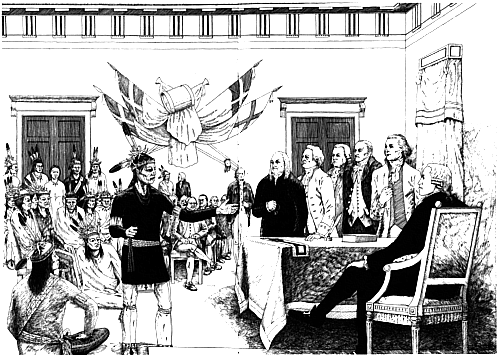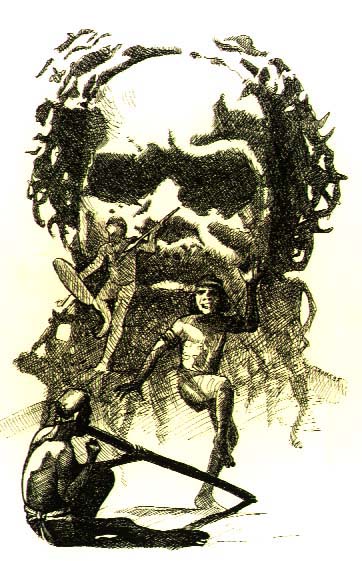Exemplar of Liberty:
Native America and the Evolution of Democracy
By
Donald A. Grinde, Jr.
Rupert Costo Professor of American Indian History
University of California at Riverside
and
Bruce E. Johansen
Associate Professor of Communication
University of Nebraska at Omaha
Every king hath his council, and that consists of all the old and wise men of his nation. . . . [N]othing is under- taken, be it war, peace, the selling of land or traffick, without advising with them; and which is more, with the young men also. . . . The kings . . . move by the breath of their people. It is the Indian custom to deliberate. . . . I have never seen more natural sagacity. --William Penn to the
Society of Free Traders,
16 August 1683
Coming from societies based on hierarchy, early European explorers and settlers came to America seeking kings and queens and princes. What they sought they believed they had found, for a time. Quickly, they began to sense a difference: the people they were calling "kings" had few trappings that distinguished them from the people they "ruled," in most native societies. They only rarely sat at the top of a class hierarchy with the pomp of European rulers. More importantly, Indian "kings" usually did not rule. Rather, they led, by mechanisms of consensus and public opinion that Europeans often found admirable.During the 170 years between the first enduring English settlement in North America and the American Revolution, the colonists' perceptions of their native neighbors evolved from the Puritans' devil-man, through the autonomous Noble Savage, to a belief that the native peoples lived in confederations governed by natural law so subtle, so nearly invisible, that it was widely believed to be an attractive alternative to monarchy's overbearing hand. The Europeans' perceptions of Indian societies evolved as they became more dissatisfied with the European status quo. Increasingly, the native societies came to serve the transplanted Europeans, including some of the United States' most influential founders, as a counterpoint to the European order. They found in existing native polities the values that the seminal European documents of the time celebrated in theoretical abstraction -- life, liberty, happiness, a model of government by consensus, under natural rights, with relative equality of property. The fact that native peoples in America were able to govern themselves in this was provided advocates of alternatives to monarchy with practical ammunition for a philosophy of government based on the rights of the individual, which they believed had worked, did work, and would work for them, in America.
By 1776, Iroquois imagery was used not only in treatymaking but also as a pervasive idiom in American society. A few weeks after Paine's use of Iroquois imagery, John Adams (Paine's fellow delegate from Massachusetts) would have dinner with several Caughnawaga Mohawk chiefs and their wives in Cambridge, Massachusetts. George Washington and his staff also were present. Washington introduced Adams to the Mohawks chiefs as one of the members "of the Grand Council Fire at Philadelphia" and Adams noted in a letter to his wife that the Mohawks were impressed with Washington's introduction. Although it can be argued that George Washington and the Continental Congress used American Indian rhetoric and imagery to explain to Native American people the nature of the new American government, such an argument does not explain how such rhetoric begins to occur in Robert Treat Paine's private correspondence to Non-Indians. Actually, the ideas and symbols of Native America became important facets in the formation of a new American identity.
And the Six Nations, Iroquois confederacy that so influenced the founding fathers of America also influenced Marx and Engels.
Two contemporaries of Buffalo Bill, Karl Marx and Frederich Engels, about the time of the Custer Battle were drawing on the Indian models to support their theories of social evolution. As had Franklin and Jefferson a century before, Marx and Engels paid particular attention to the lack of state-induced coercion and the communal role of property that operated in the Iroquois Confederacy.
Marx read Lewis Henry Morgan's Ancient Society, which had been published in 1877, between December 1880 and March 1881, taking at least ninety-eight pages of handwritten notes. Ancient Society was Morgan's last major work; his first book-length study had been The League of the Ho-de-no-sau-nee or Iroquois (1851). Morgan was a close friend of the Seneca Ely Parker, a high-ranking Civil War officer. Like Johnson, Weiser, Colden, and others, Morgan was an adopted Iroquois. When Marx read Morgan's Ancient Society, he and Engels were studying the important anthropologists of their time. Morgan was one of them.
Marx's notes on Ancient Society adhere closely to the text, with little extraneous comment. What particularly intrigued Marx about the Iroquois was their democratic political organization, and how it was meshed with a communal economic system -- how, in short, economic leveling was achieved without coercion.
During the late 1870s and early 1880s, Marx remained an insatiable reader, but a life of poverty and attendant health problems had eroded his ability to organize and synthesize what he had read. After Marx died, Engels inherited his notes and, in 1884, published The Origin of the Family, Private Property and the State, subtitled In Light of the Researches of Lewis H. Morgan. The book sold well; it had gone through four editions in German by 1891. Engels called the book a "bequest to Marx." He wrote that Morgan's account of the Iroquois Confederacy "substantiated the view that classless communist societies had existed among primitive peoples," and that these societies had been free of some of the evils, such as class stratification, that he associated with industrial capitalism. Jefferson had been driven by similar evils to depict Europe in metaphors of wolves and sheep, hammer and anvil.
To Engels, Morgan's description of the Iroquois was important because "it gives us the opportunity of studying the organization of a society which, as yet, knows no state." Jefferson had also been interested in the Iroquois' ability to maintain social consensus without a large state apparatus, as had Franklin. Engels described the Iroquoian state in much the same way that American revolutionaries had a century earlier:
Everything runs smoothly without soldiers, gendarmes, or police, without nobles, kings, governors, prefects or judges; without prisons, without trials. All quarrels and disputes are settled by the whole body of those concerned. . . . The household is run communistically by a number of families; the land is tribal property, only the small gardens being temporarily assigned to the households -- still, not a bit of our extensive and complicated machinery of administration is required. . . . There are no poor and needy. The communistic household and the gens know their responsibility toward the aged, the sick and the disabled in war. All are free and equal -- including the women.
Concern for the depredations of human rights by state power is no less evident in our time than in the eighteenth century. American Indians, some of the earliest exemplars of those rights, today often petition the United Nations for redress of abuses committed by the United States government, whose founding declarations often ring hollow in ears so long calloused by the thundering horsehooves of Manifest Destiny and its modern equivalents. One may ask what the United Nations' declarations of human rights owe to the Iroquois and other Indian nations. Take the following excerpts from the United Nations Universal Declaration of Human Rights (adopted December 10, 1948), and place them next to the Great Law of Peace, and the statements Franklin and other American national fathers adapted from experience with American Indian nations:
All human beings are born free and equal in dignity and rights. They are endowed with reason and conscience and should act toward one another in a spirit of brotherhood. (Article 1)
Every person has a right to life, liberty and security of person. (Article 3)
Everyone has a right to freedom of thought, conscience and religion. (Article 18)
Everyone has the right of freedom of opinion and religion. (Article 19)
. . . The will of the people shall be the basis of the authority of governments . . . (Article 21)
Looking across the frontier, as well as across the Atlantic, looking at Indian peace as well as Indian wars, history poses many tantalizing questions. The thesis that American Indian thought played an important role in shaping the mind of European America, and of Europe itself, is bound to incite controversy, a healthy state of intellectual affairs at any time in history, our own included. The argument around which this book is centered is only one part of a broader effort not to rewrite history, but to expand it, to broaden our knowledge beyond the intellectual strait jacket of ethnocentricism that tells us that we teach, but we do not learn from, peoples and cultures markedly different from our own.
See:
Jamestown; The Birth of Capitalism
The Era Of The Common Man
1666 The Creation Of The World
The Many Headed Hydra
ind blog posts, photos, events and more off-site about:
social credit, Edward Gibbon Wakefield, Marx, agrarian, farmers, populism, populist, producer, producerism, distributionism, Hilare Belocq, Quebec, Conservatives, colonization Canada, US, Grange, left-libertarian, libertarian-left, agorist, free-market, Von-Mises, Hyaek, Austrian-School, migrant workers, Canada, Britain, immigrants, temporary workers, nannies, farm workers, Chinese, labour, labor, employment, slavery, migration, immigration, USA, Europe, free-labour, labor, mutitude, Negri, Hardt, Empire, illegal, aliens, sans, papier,
capitalism,, history,, slavery,, primitive, accumulation, of, capital,, Atlantic, History,, Britain,, workers,, proletariat,, socialism,, labour, history,, labor, history,, pirates,, piracy,, colonialism,, American, colonies,,




